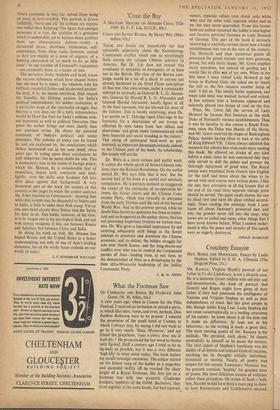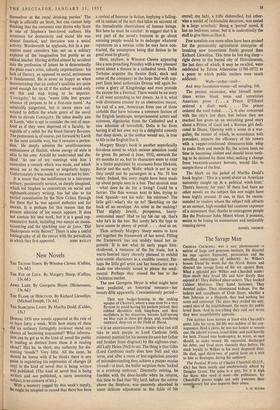Crotchety Essayist
MR. RAMSAY, Virginia Woolf's portrait of her father in To the Lighthouse, is not a likeable man. He is a domestic tyrant riddled with self-pity and self-dramatisation, the kind of portrait that Goneril and Regan might have given of their father if they had possessed the intelligence of Vanessa and Virginia Stephen as well as their independence of mind. But like olost people in life, though unlike King Lear, Leslie Stephen did not come catastrophically to a healing awareness of his nature : he knew about it all the time and it made no difference. At least not to his behaviour; to his writing it made a great deal. The most moving aspect of Mr. Ramsay is his solitude. 'We perished, each alone,' he chants mournfully to himself as he paces the terrace. The vital aspect of Stephen's loneliness was his• dislike of all intense and isolated kinds of creation, anything (as he thought) wilfully individual, hysterical or morbid. Nearly all poetry was suspect for this reason; Tennyson's 'Mariana' was, his greatest aversion; 'healthy' his greatest term of praise. His most felicitous strokes of criticism reflect these prejudices. He writes of Scott—`with him, Hamlet would have been a mere peg to show us how Rosencrantz and Guildenstern amused
themselves at the royal drinking parties.' The laugh is officially on Scott, but one cannot help thinking that the comment also shows why Scott is one of Stephen's best-loved authors. His reverence for domesticity and social life was almost fanatical, and literature was a social activity. Wordsworth he applauds, but in a per- ceptive essay considers him not as a solitary explorer of the imagination but purely as an ethical teacher. Having drifted almost by accident into the profession of letters he is determinedly the plain man's critic, robustly unpretentious: his
lack of literary, as opposed to social, seriousness p is fundamental. He is never so happy as when demonstrating that an author's qualities are quite good enough for us all if the author would only see this and stop trying to be superior. 'Coningsby,' he says, 'wants little but greater absence of purpose to be a first-rate novel.' An admirable judgement, but it seems more cal- culated to deflate the whole genre of the novel than to elevate Coningsby. He takes deadly aim at Lamb, 'who is apt to consider the rest of man- kind as if they were deprived of a faculty, in- capable of a relish for the finest literary flavours. The pretension is, of course, put forward by Lamb in the most amiable way, but it remains a preten- sion.' He deeply admires the unselfconscious enthusiasms of Hazlitt, whose energy of style is akin to his own. Arnold he underrated and dis- liked. 'At one of my meetings with him I remember a remark which was made, and which struck me at the moment as singularly happy. Unfortunately it was made by me and not by him.'
It is ironic that the indifference to a literature solitary, passionately serious, or deeply imagined, which led Stephen to concentrate on social and eighteenth-century writing, has led also to his partial canonisation by the New Critics. Enough for them that he was against aesthetics and for morals. It is perhaps for this reason that the present selection of his essays appears. It does not contain his best work, but it is a good rep- resentative batch, including two essays on moun- taiileering and the sparkling tour de force, 'Did Shakespeare write Bacon?' There is also a useful bibliography of all the essays with the periodicals in which they first appeared. JOHN BAYLEY



































 Previous page
Previous page